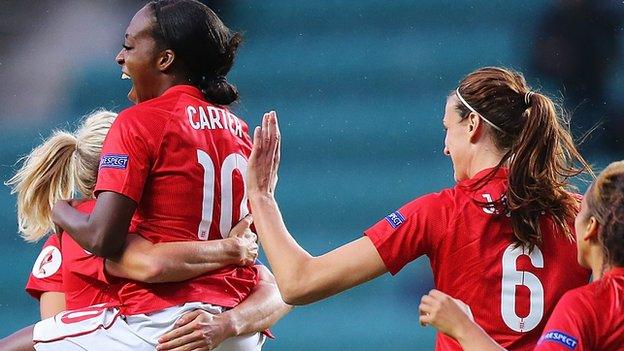Rugby World Cup 2015: Bigger, faster, stronger, dirtier?
- Published
'Youth susceptible to steroid use'
A world championship has started, the governing body promises a record number of drugs tests and Russia top the global banned list…no, you have not heard this one before, this is rugby union, a sport that has certainly grown up since its first World Cup in 1987.
Pick almost any of the teams at this year's tournament and compare them to their 1987 equivalents: the backs will be as heavy as forwards used to be, and today's forwards will be three stone heavier than yesterday's big men.
Sure, all of us are bigger on average than even our recent ancestors, but rugby union's new dimensions are a remarkable testament to the additional time, money and expertise that came in when the sport went professional in 1995.
Or that is what the sport's bosses will tell you.
But there is another theory to explain how the game got bigger, faster and stronger. It is why governing body World Rugby, external is spending more money on anti-doping than ever before, the federations are catching more cheats than ever before and anti-doping agencies are talking about the sport more than ever before.
Put simply - and it is a simple idea - rugby union got on the gear.
More from rugby: |
|---|
For the latest rugby union news, follow @bbcrugbyunion, external on Twitter |
"There is going to be a temptation to dope, that will be too strong for some to ignore, in any situation where your success depends on physical characteristics from early on," said one anti-doping expert, who wished to remain anonymous.
"That is what made cycling so vulnerable: young guys, desperate to stand out in a team environment, where the advantage to be gained from doping would be enough to ensure a career.
"Is rugby any different? The physiology is but the concept is the same."
But it is just a theory and every theory, like elite athletes, needs to be tested.
Is rugby union, to paraphrase Tony Blair,, external still a pretty straight sort of sport, or is it as low down and dirty as baseball's asterisk years,cycling's EPO era or Russian athletics?
Damned if you do; damned if you don't
When it comes to anti-doping, there is a very obvious Catch-22. Take it seriously and catch people (because there are cheats in every area of human activity), or pretend to take it seriously and catch nobody.
Do the former and you have a "drugs problem"; do the latter, no problem…until a superstar makes a mistake and the edifice of propriety collapses.
You hear this dilemma a lot when you talk to people involved in the game's anti-doping efforts. They are well aware of the fact that rugby union tops UK Anti-Doping's (Ukad) banned list, external and that the trend over the last 12 months suggests the situation is deteriorating.
But they believe this is really a reflection of the sport's values and them doing their jobs properly.
"We have grasped the nettle," said Stephen Watkins, the manager of the Rugby Football Union's (RFU) anti-doping programme.
"All our testing is intelligence-led and targeted, and we get information from the police, the Border Agency, Ukad and the clubs themselves. They share their suspicions.
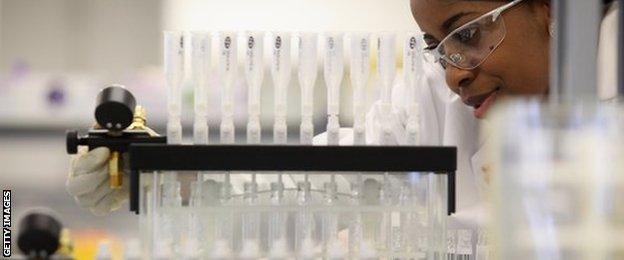
Players based in England were tested a record 791 times last season, according to the Rugby Football Union, up from 616 tests a year before, with big increases in the amounts done below the top tier
"Our experience is that the rugby fraternity does not tolerate it."
That sentiment is echoed by Watkins' counterpart at World Rugby, David Ho, who said the game's "values" of fair play and mutual respect were the difference between rugby union and sports more afflicted by doping.
"I think other sports are envious of those values," said Ho, whose organisation has just increased its anti-doping budget by 30% to £1.5m a year, the same amount the IAAF, the governing body of athletics, spends on drug testing.
The RFU carried out nearly 800 tests last season, up almost a third on the previous campaign with increases at every level from the Under-17s in the top clubs' academies to those on Six Nations duty.
The biggest increase, however, came in the tiers just below the Premiership, and this is where players are getting caught.
Sixteen of the 48 people serving Ukad bans come from rugby union. Rugby league is next, then boxing. Cycling, for so long doping's poster boy, is in a tie for sixth.
No player has tested positive in England's top flight for more than four years, but rugby union is responsible for 11 of the 25 cases recorded by Ukad in the last 12 months.
Read one of these sorry stories and you have almost read them all: an amateur, for a team you have never heard of, wants to get bigger so buys "something" - sometimes a steroid but usually a mislabelled or contaminated supplement with a macho name - from the internet, or a "bloke at the gym" and fails the first drugs test they are given.
Some of these cases are attempts to enhance performance - unequivocal cases of cheating - but others look a lot like symptoms of a much wider problem.
"Go to any newsagents and look at the magazines: the women's ones are all about losing weight, the men's ones are about gaining it," said Watkins.
"We know societal steroid use is up and it is very probably under-reported. The sad fact is that some of that falls into our sphere."
Mixed messages & muscle mania
I have heard exactly the same explanation from anti-doping experts in Australia and South Africa: "bigorexia" is the issue, not cheating.
Dr Glen Hagemann, external is responsible for the one of the best bits of research we have into what is happening at the margins of professional rugby. He asked 12,463 students in 23 rugby-playing schools in South Africa's KwaZulu-Natal province what they were taking and why.
The most shocking of his findings were that almost one in 10 18-year-old boys had tried steroids, and rugby players were the most likely group to have done so.
The main reason they gave, though, was vanity.
"Steroids have become a lifestyle drug and many of the students did not even see it as cheating," said Hagemann, who does not think doping is a serious problem at the elite level in South Africa.
"I'm not saying it doesn't happen, but I am saying there is a genuine interest in keeping it clean.
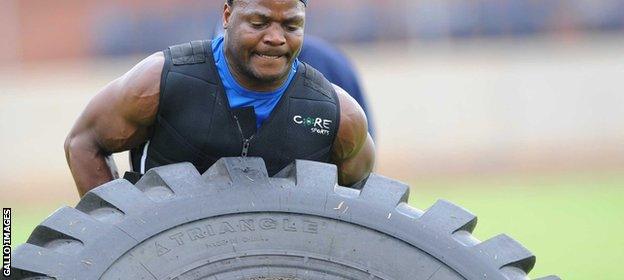
Ex-South Africa hooker Chiliboy Ralepelle was given a two-year ban earlier this month after testing positive for a banned substance for a second time - he was cleared in 2010
"If there is a problem, it is in the schools, where you cannot test without the school's permission, and at the club level, where there is very little testing."
Professor Stephen Moston, from the University of Canberra, has carried out similar studies in Australia, with similar responses.
"It's everywhere now - it's become normal to some groups," said Moston, when asked by reporters about doping among junior athletes.
"Young athletes think they are supposed to dope and there's no serious attempt to stop them."
Aurora Andruska,, external who led the Australian Sports Anti-Doping Authority's bruising investigations into team-sponsored doping in Australian Rules Football and rugby league, is certainly not frightened to ruffle the feathers of the sports establishment. But she agrees with those who think elite rugby union is relatively clean.
"I have concerns about performance-enhancing drugs across all of society - everybody from actors to doormen to prison officers - but when we looked at rugby union the problem areas seemed to be with guys trying to get that first contract, and then later when they were trying to hang on to it," said Andruska.
But there are some voices singing a different tune.
Values or vice? The French experience
Laurent Benezech is no stranger to French rugby's dog house.
"When I was a player I set up a players' union - the federation thought I was a communist," the 48-year-old said with a chuckle.
"So I am used to being the pain-in-the-arse guy."
That pain got more acute when Benezech, who was capped 15 times by France in the mid-1990s, started to talk and write about doping.
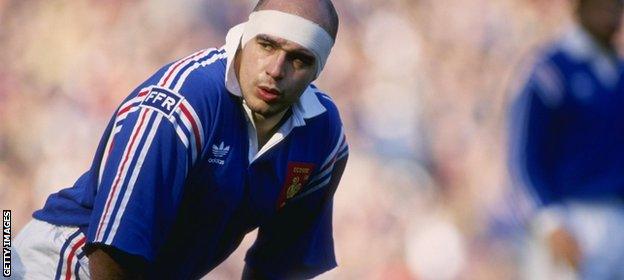
Former France and Harlequins forward Laurent Benezech claims he was given cortisone without his knowledge by a team doctor
It began when French anti-doping expert Francoise Lasne told a 2013 senate inquiry into cycling's problems that when it came to positive tests it was rugby union that led the way.
Lasne was simply stating a fact, just as Ukad chief executive Nicole Sapstead was stating a fact when she said much the same thing to a panel of MPs, external investigating athletics.
But French rugby was not in the mood for such straight-talking and Lasne was indignantly attacked by players, past and present, and the game's administrators.
Benezech, a thoughtful man, was troubled by this, particularly as he already harboured suspicions about the size and speed of the players he was watching in France's Top 14, European rugby's strongest league.
So he told French newspaper Le Monde , externalthat doping was rife in French rugby and always had been. His motivation was to warn players about the health risks of doping, especially when done in an unregulated fashion.
But there was no sign of gratitude in the response he got from the French players' union: it hit him with a defamation writ, external from more than 130 current players, each one asking for 2,000 euros in damages.
He would eventually be cleared, after the judge ruled he had spoken in good faith, but it was a stressful experience and it probably explains why his next contribution to the debate was a book, external called Rugby: Where Are Your Values?
Doping is an issue - RFU boss Ritchie
Benezech was much in demand last week when the story of an investigation into alleged fraud by a pharmacy that supplies RC Toulon, external - the winner of European rugby's premier competition, the Heineken Cup - was splashed across the French media.
The details of the investigation remain unknown but RC Toulon's colourful owner Mourad Boudjellal got on the front foot last week by saying the pharmacy, and not the club, was under the microscope, with the issue being the possible defrauding of the French health service.
"No player is concerned in this affair," said Boudjellal, before adding that jealousy of Toulon's success and French rugby politics were the reason the club had been dragged into the story.
The club has had issues in the past, though, with England's Steffon Armitage and Welsh prop Eifion Lewis-Roberts both testing positive for morphine, only to later be cleared of intentional wrongdoing. And the club has always been firm in its denials of cheating.
But Benezech believes many top clubs are exploiting grey areas in the anti-doping rules to manage injuries and keep players on the park.
Some would argue that is common sense for a successful team at the sharp end of a contact sport, and Benezech does not necessarily disagree: he just would prefer it to be done more honestly and safely.
"There is an equation for performance in top sport: steroids for muscles, growth hormone and cortisone for recovery, EPO for red blood cells and perhaps beta-blockers for concentration," he explained.
"You simply change the methods and quantities for each sport.
"Are rugby players cleverer than everybody else so they don't need to use these things? Is rugby somehow different?"
World Rugby, which only has 79 violations on its website, external after 12 years of global testing (the list mentioned in the opening paragraph, topped by Russia), says it is and points to just four positive tests from more than 2,000 samples in the last year as evidence of those "values".
Tests, trust and ticking time bombs
There is a problem with putting too much faith in tests, though, as athletics should have learned with Marion Jones, external and cycling with Lance Armstrong.
"I had big legs but a small upper body and I never tested well in the gym," said former South Africa Under-21 player Carlo Del Fava.
"Put me on a field and I was OK, because I was aggressive and had decent ball skills, but my bench press was poor and in South Africa that was everything."
So Del Fava bought some unbranded steroids from a guy at the gym. He only had enough money to buy three injections' worth and had no idea what he was doing. But that was no defence when he failed a test and he was given a two-year ban in 2002.
He took his punishment, though, and came back more determined than ever. He would eventually play 54 times for Italy and enjoy a 10-year club career that took him around Europe. But most importantly, he rebuilt his reputation.
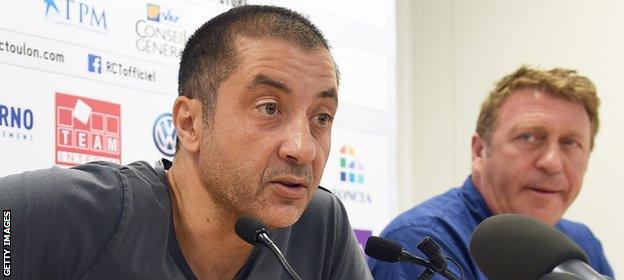
RC Toulon president Mourad Boudjellal denied his club had been cheating when news emerged earlier this month of an investigation into a pharmacy linked to the French rugby giants
That is something Sam Chalmers, the son of former Scotland and Lions star Craig Chalmers, is trying to do now after he made the same mistake as Del Fava in 2013. He too was trying to rectify a size issue.
World Rugby has belatedly realised the benefit of persuading poachers to become gamekeepers and both Chalmers and Del Fava have appeared in videos produced by the governing body as part of its Keep Rugby Clean initiative.
But these two cases fit the narrative that rugby union has settled on: we do not have a problem, just isolated cases of youngsters making bad decisions, often because they want to look better on the beach.
This explanation makes sense only if you believe people who have got away with something stop doing it when they have achieved a certain goal, such as a better bench press, bigger biceps or a professional contract.
That is not the experience of rugby league in England and Wales, where Ukad continues to catch players higher up the chain, or in South Africa where rugby union is the most tested sport.
Khalid Galant, the chief executive of South African Institute for Drug-Free Sport, external, said that "gym culture and the ubiquity of supplements" were "a major problem", even at Super 15 level.
"I have been amazed at what I perceive to be rugby's naivety regarding doping," said the anti-doping expert quoted earlier.
"They really do believe these values give them some immunity.
"If you confront them they stand behind their testing, which other sports have clearly shown is basically impotent. I believe doping will grow to become rugby's biggest challenge."
- Published22 September 2015
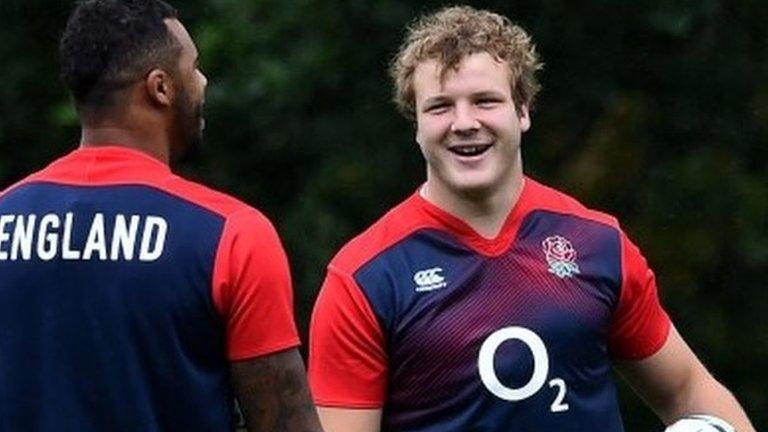
- Published21 September 2015
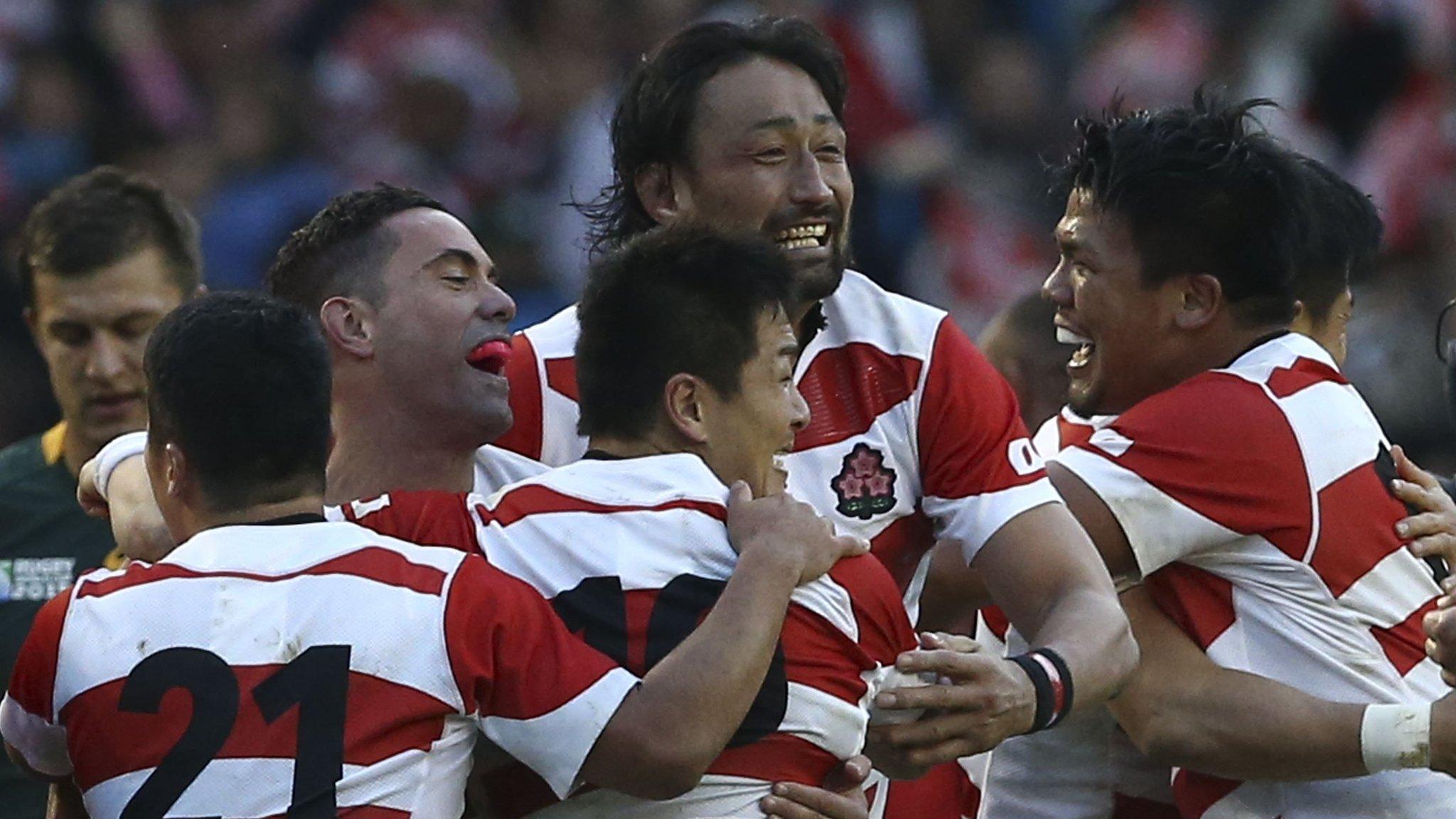
- Published21 September 2015
